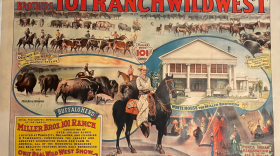On this date in 1917, Governor Lynn Frazier affixed his signature to Senate Bill 294. One little item had been quietly slipped into the bill, which had theater owners across the state rejoicing. Movie theaters could now open on Sundays.
The bill also provided that bathing beaches, Chautauqua assemblies, pleasure resorts, boating, swimming, and canoeing were now legal on Sundays. The bill had initially passed in the Senate, but was killed in the House. Theater owners influenced the addition of an amendment, allowed corporations, companies, and individuals to hold meetings on Sundays for educational or agricultural research, and they could charge admission. This is the version of the bill that passed.
Theater owners had long asserted that if Chautauquas could operate on Sundays and show movies, theaters should be able to do the same. H.L. Hartman, president of the North Dakota Theater Men’s Association, said that under the new law theaters could open on Sundays. They would just have to include a film with educational content. Newsreels and travel films would fall into that category. They would be shown as the main advertised feature, but theaters could add other movies to the Sunday lineup. In this way theaters could show first run movies and still stay within the law. Hartman said the association lawyers had assured him this was the case. All laws then on the books that conflicted with the new law were automatically repealed.
Sunday “blue laws,” as they were called, were designed to restrict Sunday business activities for religious purposes. There is little documentation to indicate why they are called “blue laws.” One theory, that they were originally printed by Puritans on blue paper, has been shown to be false. Another theory is that “blue” was used as a disparaging term for something perceived to be rigidly moral. A “bluenose,” for example, is someone who advocates a rigorous moral code.
North Dakota maintained restrictive blue laws right into the twenty-first century. For example, the state’s law banning shopping on Sunday mornings ended in 2019 when House Bill 1097 was signed by Governor Burgum, allowing stores to open early, and letting shoppers buy what they fancied.
Dakota Datebook by Carole Butcher
Sources:
Fargo Forum and Daily Republican. “Declare Theaters May Be Opened Under Rider on Chautauqua Measure.” Fargo ND. 3/10/1917. Page 1.
Snopes. “Etymology of Blue Laws.” https://www.snopes.com/fact-check/blue-laws/ Accessed 2/2/2020.
KVRR Local News. “Blue Laws in North Dakota Are History.” https://www.kvrr.com/2019/08/04/blue-laws-in-north-dakota-are-history/ Accessed 2/2/2020.



